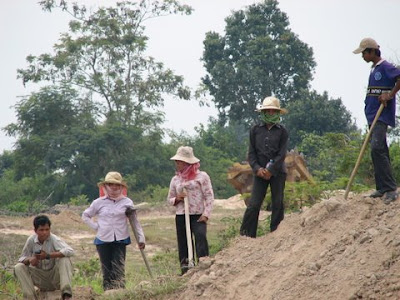
Met Sin, shown above, has been living on or close to the Trau Kod embankment for his entire life. Unfortunately, it was not safe for Met Sin and his wife to stay in their current location. It would be unsafe for them to stay during the embankment repair operations and later to be living and farming on the embankment.

Human Translation had been working with the District Government, the local community, and the Met Sin to resolve this issue. The District Government obtained a letter with Met Sin's thumb print stating that he agreed to move, the local Village Chiefs agreed to collect rice from the villagers benefiting from this project to donate as compensation, and HT has continued to communicate with him to make sure he understood our plan and he felt he was being treated fair.

Once we all agreed upon a moving date we built a new platform out of soil using our excavator, dump truck and bulldozer then used our local laborers to dismantle, move and rebuild his house. It has been a long process and frustrating at times but it HT has been patient and plans to continue communication with Met Sin throughout construction and in the future.

















































